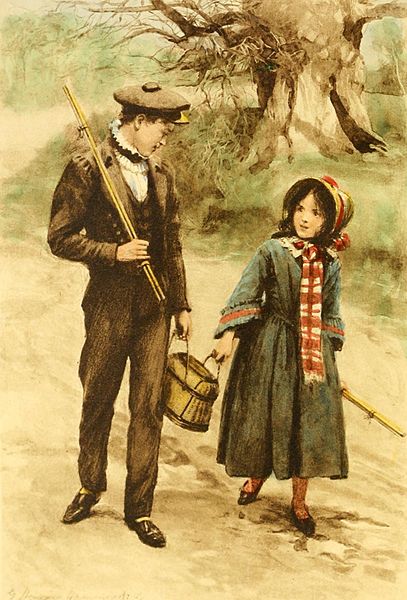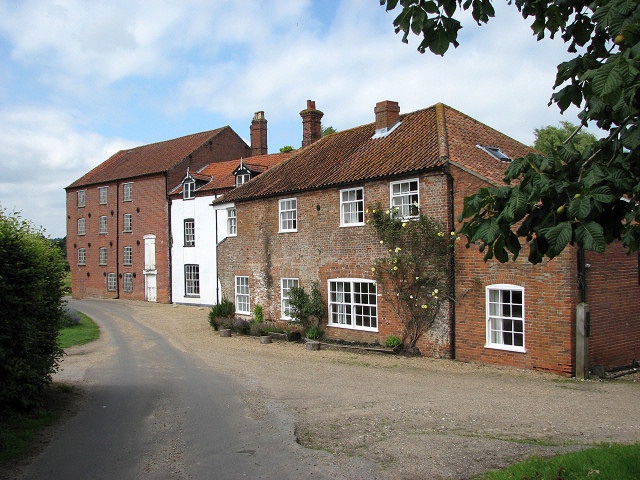 “A wide plain, where the broadening Floss hurries on between its green banks to the sea and the loving tide, rushing to meet it, checks its passage with an impetuous embrace.”
“A wide plain, where the broadening Floss hurries on between its green banks to the sea and the loving tide, rushing to meet it, checks its passage with an impetuous embrace.”
In The Mill on the Floss, George Eliot takes the reader into a lazy, peaceful part of England, where life is lived in a slow reverie with the river ebbing and flowing and yet hard work and struggles can be at the forefront of existence. Yet within the scenery and the everyday monotony, there are people who live their lives with hopes and cares, frustrations and joys, dreams and tragedies.
“We could never have loved the earth so well if we had had no childhood in it, if it were not the earth where the same flowers come up again every spring that we used to gather with our tiny fingers as we sat lisping to ourselves on the grass, the same hips and haws on the autumn hedgerows, the same redbreasts that we used to call ‘God’s birds’ because they did no harm to the precious crops. What novelty is worth that sweet monotony where everything is known and loved because it is known?”
Maggie and her brother, Tom, are part of the Tulliver family, her father owning and running the mill that lies along the river Floss. Maggie is nine years old and Tom is thirteen when the story begins and Maggie, in spite of having a fair, biddable mother who was part of a successful family, is dark and uncooperative and restless, her soul at times angry at the expectations placed upon her, yet also yearning for love and acceptance. All her love she lavishes on her brother, Tom, whom she adores, however, Tom appears to take more pleasure in censuring Maggie, highlighting her faults and drawing enjoyment from making her beg for his approval. Maggie’s love of books and learning tend to assuage some of the turmoil in her life but her unsatisfied and troubled character is always boiling below the surface.
Maggie’s father is determined that Tom will grow up to be an educated man much finer than himself, although he apparently has little concrete ideas of what makes one and thus sends Tom off with a vicar to learn Greek and Latin and literature for which Tom is ill-equipped to learn. At “school” he eventually meets Philip Wakem, an intelligent, deformed hunchback and the son of his father’s nemesis, a land-owner who has diverted water from the stream, affecting Mr. Tulliver. While Tom and Philip form a tentative friendship, it eventually disintegrates due to the animosity between the two families and Tom, at least for his part, sees Philip as a mortal enemy.
A tragedy occurs with Maggie’s father and while Maggie rekindles her past friendship with Philip, it blossoms into something much deeper due to Phlilip’s soft intellect and care and even his unrelenting persuasion. But when cousin Lucy invites Maggie for a visit and introduces her to her fiancée, Steven Guest, all clear-thinking and rationality is abandoned and culminates with consequences no one could foresee.
Eliot does leave the reader with many questions: Was Philip simply loved by Maggie because he epitomized the relationship Maggie wanted with Tom and never had? Was Eliot trying to portray Maggie’s love for her brother as unhealthy, as it seemed all-consuming? Did Tom’s education help or hurt his life experience? Was self-renunciation, which brought a quite contentment, better than heated and overwrought feelings that brought chaos, not only to the parties involved, but also affected others? Are rules and expectations in a society beneficial because they bring balance and peacefulness? Do we behave, as those on the outside of Maggie’s transgression, with judgement and gossip, or do we try to act with understanding and grace towards others even when we believe they’ve done wrong?
“There is something sustaining in the very agitation that accompanies the first shocks of trouble, just as an acute pain is often a stimulus, and produces and excitement which is transient strength. It is in the slow, changed life that follows — in the time when sorrow has become stale, and has no longer an emotive intensity that counteracts its pain — in the time when day follows day in dull unexpectant sameness, and trial is a dreary routine; — it is then that despair threatens; it is then that the peremptory hunger of the soul is felt, and eye and ear are strained after some unlearned secret of our existence, which shall give to endurance the nature of satisfaction.”
While Eliot’s magnum opus, Middlemarch, is an over-arching representation of a whole town and community, a symphony, a kaleidoscope of characters and life circumstances, conversely The Mill on the Floss is a narrowed view of a particular family in a particular place in a village and also within history. It’s as if Eliot wanted to thoroughly illustrate the mundaneness in life with characters that were limited in their scope of imagination and reasoning, to show one colour, one thread in the tapestry, to examine lives in their dullest form in order to illustrate the colour that lives in each of us.
Even though, I wasn’t that enthused with the characters of Maggie and Tom, I quite enjoyed the first part of the novel. Once again, Eliot’s writing was magnificent. But later the plot seemed to ramble on and on with melodramas stretched out to the breaking point. And the end! Oh the end! Did Eliot not know what to do with her characters? Had the novel run away from her? I suspect it had, as I sensed an inattention to detail and deliberately overly-dramatized events, one upon the other, and the ending itself was rather cheap. Yet, while overall the novel was a disappointment, it still did not diminish Eliot’s talent, which is apparent with every stroke of her pen.
More George Eliot Book Reviews:






Yep, lots of melodrama in this one. Of her books I’ve read so far, Adam Bede would have to be my favourite. It is even funny in places!
Oh Carol, I’m sooo glad to hear that Adam Bede is your favourite. It is one of the few George Eliot novels that I haven’t read yet so it’s a relief to know I have a good one coming up. After this one, I was worried …. 😳
I have read this a long time ago, and didn’t like it. Melodramatic is one way to describe it. And both main characters are not pleasant.
Sadly, I’d have to agree. I didn’t find any character particularly likeable and, what’s more, I didn’t learn anything from any of them. I wonder what Eliot thought of this novel when she looked back on it. After masterpieces like Middlemarch and Daniel Deronda, I can’t imagine that she was happy with it.
I loved The Mill on the Floss and read it for a demanding 19th Century English Novel course in college, which was followed by Middlemarch. Loved, loved them both! So absorbing, so interesting to see George Eliot’s development as a writer.
I absolutely LOVED ❤️ Middlemarch, however I thought The Mill on the Floss was much weaker. So yes, I agree that the development was huge between the two novels. Good to hear from you and hope all is well!
It’s been a long time since I read this, but I definitely remember liking it. I think it was the first one I read after Middlemarch. I liked Maggie! I’ve been thinking about rereading this & this is an inducement.
George Eliot had a rather troubled relationship with her brother. I think that may be behind this.
But Adam Bede is better if you haven’t read that one. It’s pretty great.
I hope you read it again, as it would nice to have your thoughts with a more mature outlook on it from your last read. I just thought Maggie’s behaviour was frustrating. It was as if she had no self-control in a childish way when a child and in an adult way when an adult. Ugh!
I had no idea she even had a brother. That’s fascinating. You definitely felt the frustration and the helplessness in Maggie’s relationship with Tom. Hmmmm ….
Yea, Adam Bede! I’m looking forward to it!!
I think Marian/George was supposed to be very close to her brother when they were kids, but then when she was living with George Henry Lewes but not married to him, he cut her off completely. Maybe suggestive of the ending?
I’ve been thinking about rereading Mill on the Floss since I read all the George Eliots I hadn’t read before a couple of years ago. So many books… 😉
Pingback: 2022 Year In Review - Classical CarouselClassical Carousel